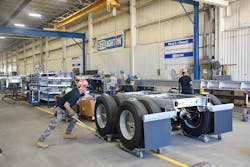While the ebb of flow of Trump administration trade policy has dominated the daily news for months, trailer manufacturers have taken specific steps to protect domestic manufacturing, with a pair of requests to the U.S. government for intervention.
The American Trailer Manufacturers Coalition recently asked the U.S. Department of Commerce to include refrigerated and dry van trailers, and their subassemblies, within the measures on steel and aluminum derivative products under Section 232 of the Trade Expansion Act of 1962.
The ad hoc coalition of U.S. trailer manufacturers includes Great Dane, Stoughton Trailers, Strick Trailers, and Wabash, according to advisory firm Wiley Rein, which submitted the requests. The May 15 submission explains that imports of foreign-made reefers and dry vans incorporating foreign-made steel and aluminum articles have undermined the effectiveness of the Section 232 tariffs, threatening the vitality of the U.S. dry van and reefer industry.
Production facilities for the four requesting companies are located throughout the U.S., including Arkansas, Georgia, Illinois, Indiana, Nebraska, Pennsylvania, Tennessee, and Wisconsin, and these facilities have been harmed by unfairly priced imports of dry vans and reefers, the coalition argues.
The coalition requests the tariffs be applied to allow the U.S. dry van and reefer industry to remain commercially competitive and “level the playing field” against foreign imports that would otherwise be exempt from the effects of the tariffs.
The Commerce Department is scheduled to make a determination on the coalition’s request within 60 days of its submission, Wiley reported. If the manufacturers’ request is granted, the steel and aluminum content of imports of reefers and dry vans entering under Harmonized Tariff Schedule subheading 8716.39.0040 will be subject to 25% tariffs.
The tariffs would not apply to the value of the entire trailer, but rather the full value of the steel and aluminum content within the trailer, according to the Wiley statement.
Chassis, part 2
The action comes just weeks after the U.S. International Trade Commission determined that there is a reasonable indication that the U.S. intermodal chassis industry is materially injured due to imports of chassis and subassemblies from Mexico, Thailand, and Vietnam, allegedly sold at less than fair value and subsidized by the governments of Mexico and Thailand.
This is a renewed challenge by U.S manufacturers, including several of which that are also part of the ad hoc van coalition, that in 2021 successfully sought relief from Chinese chassis imported for assembly in the U.S.
The Feb. 26 filing, also by the Wiley firm, comes from the U.S. Chassis Manufacturers Coalition, whose members are Cheetah Chassis and Stoughton Trailers. Responding in opposition were Hyundai Translead, a Korean-owned subsidiary of Hyundai Motor Corp. which imports chassis into the U.S. from its manufacturing facilities in Mexico, along with CIE Mfg., a unit of Chinese industrial giant CIMC, that imports chassis components and assembles them in the U.S., along with Dee Siam Manufacturing Co., also an assembler of finished chassis in the U.S. and a producer/exporter of chassis components in Thailand.
During a March 19 trade commission hearing, Stoughton President & CEO Bob Wahlin testified about the harmful impact of chassis imports from Mexico, Thailand, and Vietnam.
He noted that he had previously appeared in March 2021, and recounted the industry had been injured by dumped and subsidized chassis from China, which forced Stoughton to idle production capacity and lay off most of its chassis production workforce. Preliminary trade relief in that case helped the industry begin to recover, as Stoughton was able to restart production in Evansville, Wisconsin, add a new production line in Stoughton, Wisconsin, and open a new facility in Waco, Texas in 2022, building a workforce of nearly 200 employees. These investments aimed to position Stoughton to take advantage of market demand and recover from the prior injury.
However, a new surge of dumped and subsidized imports from Mexico, Thailand, and Vietnam quickly prevented this full recovery, Wahlin explained. While production and sales increased in 2022 and 2023, Stoughton believes they could have done more, at better prices, without the unfairly priced imports. Even with strong demand, Stoughton's capacity utilization remained below 50%, while imports captured the majority of the domestic market by underselling.
Although freight demand has tapered since then, overbuying caused by dumped and subsidized imports in 2022 and 2023 led to chassis sitting idle and buyers significantly reducing orders since 2024. Stoughton has lost sales and faces increased pricing pressure, losing orders for around 3,000 chassis totaling over $59 million in business since 2023, Wahlin reported. The situation, similar to what happened with China, has forced Stoughton to shut down chassis production at its Waco, Stoughton, and Evansville facilities, lay off most of its workforce, and dramatically reduce wages and hours.
Markets the problem, not imports
Sean Kenney, CEO of Hyundai Translead, argued that the petition requesting trade relief falls short of demonstrating injury to American manufacturers in the key areas examined by the commission: volume, pricing, overall impact, and threat.
Regarding volume, Kenney questioned the petition's assertion that over 40,000 "complete chassis" were imported from Mexico in 2024. He cited market researchers and 2024 data that showed a 90% decrease in overall industry volume compared to 2023. So the idea that high import volumes caused the domestic market's deterioration is neither understandable nor accurate. The run-up in chassis demand prior to 2024 was a result of the Covid-19 pandemic, Kenney explained, and the supply chain eventually normalized, resulting in an abundance of equipment with low utilization and little need for new chassis for several years. Hyundai Translead anticipated this downturn and planned its investments accordingly, finding the market shift "rather easily forecasted," he added.
Simply, some U.S. chassis manufacturers overproduced ahead of a down market, and any resulting financial harm cannot be blamed on imports, Kenney suggested.
Hyundai Translead's imports in 2024 were a fraction of their 2023 volume and are not projected to return to previous levels soon, Kenney explained. He concluded that with the new Trump tariffs in place, there is no reason to suspect these imports pose a threat, and questioned why the petition was filed when import volumes are low.
Kenney also expressed concern that trade barriers removing capacity could lead to fewer choices and an inability to serve the market when it stabilizes.
In an April 12 vote, however, the ITC decided to continue the investigation to determine the relief needed to overcome the unfair trade practices. The petition puts the alleged dumping margins for Mexico at 32.37%; Thailand, 234.06%; and Vietnam, 304.68%. A preliminary determination is due in September.
About the Author
Kevin Jones
Editor
Kevin has served as editor-in-chief of Trailer/Body Builders magazine since 2017—just the third editor in the magazine’s 60 years. He is also editorial director for Endeavor Business Media’s Commercial Vehicle group, which includes FleetOwner, Bulk Transporter, Refrigerated Transporter, American Trucker, and Fleet Maintenance magazines and websites.
Working from Beaufort, S.C., Kevin has covered trucking and manufacturing for nearly 20 years. His writing and commentary about the trucking industry and, previously, business and government, has been recognized with numerous state, regional, and national journalism awards.

